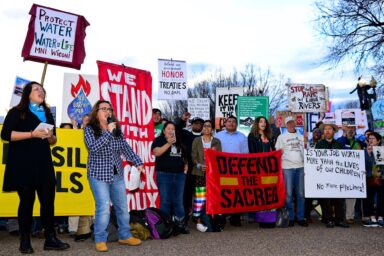PICKS are stories from many sources, selected by our editors or recommended by our readers because they are important, surprising, troubling, enlightening, inspiring, or amusing. They appear on our site and in our daily newsletter. Please send suggested articles, videos, podcasts, etc. to picks@whowhatwhy.org.
|
Listen To This Story
|
Eight US Newspapers Sue OpenAI and Microsoft for Copyright Infringement (Maria)
The author writes, “A group of eight US newspapers is suing ChatGPT-maker OpenAI and Microsoft, alleging that the technology companies have been ‘purloining millions’ of copyrighted news articles without permission or payment to train their artificial intelligence chatbots. The New York Daily News, Chicago Tribune, Denver Post and other papers filed the lawsuit on Tuesday in a New York federal court.”
How Far Trump Would Go (DonkeyHotey and Dana)
From Time: “Donald Trump thinks he’s identified a crucial mistake of his first term: He was too nice. We’ve been talking for more than an hour on April 12 at his fever-dream palace in Palm Beach. Aides lurk around the perimeter of a gilded dining room overlooking the manicured lawn. When one nudges me to wrap up the interview, I bring up the many former Cabinet officials who refuse to endorse Trump this time. Some have publicly warned that he poses a danger to the Republic. Why should voters trust you, I ask, when some of the people who observed you most closely do not? As always, Trump punches back, denigrating his former top advisers. But beneath the typical torrent of invective, there is a larger lesson he has taken away. ‘I let them quit because I have a heart. I don’t want to embarrass anybody,’ Trump says. ‘I don’t think I’ll do that again. From now on, I’ll fire.’”
How Today’s Antiwar Protests Stack up Against Major Student Movements in History (Laura)
The author writes, “Just like the protesters who came before them, the students who are now being arrested, and in some cases suspended, for setting up encampments on their campuses in solidarity with Palestinians in Gaza have been demonized by politicians. … Some of their demands, including divestiture from firms that support Israel’s war and occupation, mirror demands that past protesters made to divest from South Africa’s apartheid government. And their discontent has similarly intensified in the face of police crackdowns. But there are key differences as well. Besides their smaller size, the present-day protests have faced swifter suppression than their predecessors dealt with. In perhaps the most extreme example at the University of Texas at Austin, administrators quickly dispatched police with horses and riot gear absent any signs of violence; charges were later dropped against all 57 arrested.”
The New Sundown Towns (Dana)
From The New Republic: “As Grants Pass, Oregon — and the nation — await a Supreme Court ruling on just how far cities can police the homeless, a volunteer mayor and her unhoused constituents try to weather the backlash.”
It’s the End of the Web as We Know It (Sean)
From The Atlantic: “The web has become so interwoven with everyday life that it is easy to forget what an extraordinary accomplishment and treasure it is. In just a few decades, much of human knowledge has been collectively written up and made available to anyone with an internet connection. But all of this is coming to an end. The advent of AI threatens to destroy the complex online ecosystem that allows writers, artists, and other creators to reach human audiences. To understand why, you must understand publishing.”
The Breathtaking Lifesaving Impact of Vaccines, in One Chart (Gerry)
The author writes, “The world has become a much safer place to be a young child in the last 50 years. Since 1974, infant mortality worldwide has plummeted. That year, one in 10 newborns died before reaching their first birthday. By 2021, that rate had fallen by over two-thirds. A lot of factors drove this change: lower poverty and better nutrition, cleaner air and water, and readily available antibiotics and other treatments. But one of the biggest contributors, a new study from the World Health Organization (WHO) concludes, was vaccines. Vaccines alone, the researchers find, accounted for 40 percent of the decline in infant mortality. The paper … estimates that in the 50 years since 1974, vaccines prevented 154 million deaths.”
Civil War Might Be the Year’s Most Explosive Movie. Alex Garland Thinks It’s Just Reporting (Reader Jim)
From AP News, “Alex Garland’s films have vividly conjured a virus-caused pandemic (2002’s ‘28 Days Later’), an uncontrollable artificial intelligence (2014’s ‘Ex Machina’) and, in his latest, Civil War, a near-future America in the throes of all-out warfare. Most filmmakers with such a record might claim some knack for tapping into the zeitgeist. But Garland doesn’t see it that way. He’s dealing, he says, with omnipresent realities that demand no great leaps of vision. He wrote Civil War in 2020, when societies around the world were unraveling over COVID-19 and the prospect of societal breakdown was on everyone’s minds. … Civil War is an ominous attempt to turn widely held American anxieties into a violent, unsettling big-screen reality. Garland’s film [opened on] the anniversary, to the day, of when the Civil War began in 1861.”




